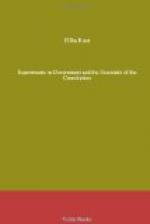The exercise of such a power would strike at the very foundation of our system of government. It would be a reversion to the system of the ancient republics where the state was everything and the individual nothing except as a part of the state, and where liberty perished. It would be a repudiation of the fundamental principle of Anglo-Saxon liberty which we inherit and maintain, for it is the very soul of our political institutions that they protect the individual against the majority. “All men,” says the Declaration, “are endowed by their Creator with inalienable rights. Governments are instituted to secure these rights.” The rights are not derived from any majority. They are not disposable by any majority. They are superior to all majorities. The weakest minority, the most despised sect, exist by their own right. The most friendless and lonely human being on American soil holds his right to life and liberty and the pursuit of happiness, and all that goes to make them up by title indefeasible against the world, and it is the glory of American self-government that by the limitations of the constitution we have protected that right against even ourselves. That protection cannot be continued and that right cannot be maintained, except by jealously preserving at all times and under all circumstances the rule of principle which is eternal over the will of majorities which shift and pass away.
Democratic absolutism is just as repulsive, and history has shown it to be just as fatal, to the rights of individual manhood as is monarchical absolutism.




